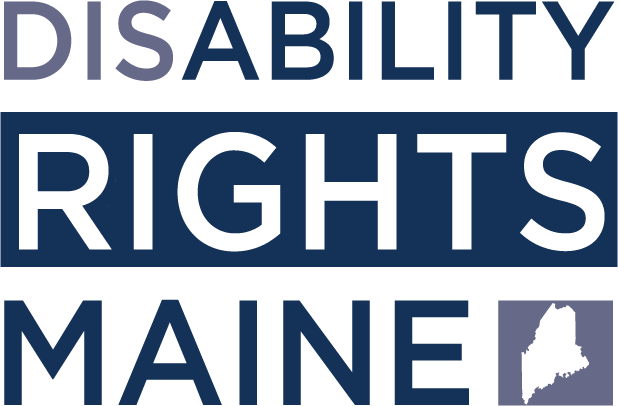by Julia Endicott | Sep 25, 2020 | Announcements
In its September 24, 2020 article “Some voters fear being ‘purged’ at the polls. Should you?” the Portland Press Herald mistakenly reports that “A clerk must remove you from the voting list if they are given notice that you have been placed under guardianship due to mental illness.” This is wrong. Any attempts to enforce this provision are unconstitutional and discriminatory.
In its article, the Press Herald incorrectly relied on obsolete language from Maine’s Constitution, language that was invalidated by a federal judge nearly 20 years ago in Doe v. Rowe, 156 F. Supp. 35 (D. Me. 2001), a case brought by Disability Rights Maine (DRM). In his ruling, U.S. District Court Judge George Z. Singal found that Maine’s Constitution violated the Due Process and Equal Protection Clauses of the Fourteenth Amendment of the U.S. Constitution. To be clear, “the U.S. Constitution gives all citizens the right to vote. [A person] can register to vote if ….. [they are] under guardianship.” https://www.maine.gov/sos/cec/elec/voter-info/right.html
DRM is concerned about the impact on the fundamental right to vote that this inaccurate article may have. At a time when concerns about voter misinformation are at an all-time high, the Press Herald’s article may further disenfranchise voters with psychiatric histories or labels of mental illness.
Since the 1990’s, the Secretary of State’s Office has worked closely with Disability Rights Maine and many other disability partners to educate municipal clerks and registrars about voting rights and to ensure that voters with disabilities have full and equal access to the polls. We are hopeful that through these efforts, municipalities will disregard the information in this article.
Kim Moody
Executive Director
Disability Rights Maine
by Megan Salvin | Sep 8, 2020 | COVID-19, Developmental Disability Advocacy
The COVID-19 pandemic has forced all of us to adjust to a “new normal” as we go about our lives. As infection rates begin to decline in harder-hit areas, signs of recovery are emerging. Restaurants, stores and public areas are slowly reopening. Throughout the pandemic, our DD team has been staying in contact with individuals with developmental disabilities and advocating with them for their rights.
One area that has been on particular concern to our clients is ensuring that they participate in the process of decision-making when it comes to accessing their communities. Services have not always been truly person-centered, and the reaction to COVID-19 has in some ways highlighted this long-standing issue, and in some ways made the issue worse. Understandably, supporters for individuals with disabilities want to ensure health and safety so that they people they serve can be protected. However, people with disabilities have the same rights as everyone else, and DRM has been working hard to make sure that people receiving services are part of the conversation so that their rights are not restricted in more extreme ways than individuals who do not have disabilities.
Since March, the DD team has regularly participated in virtual Person-Centered Planning and other meetings through Zoom. We have also moved our outreach to clients with disabilities from the physical world to the virtual one. We have conducted major outreach campaigns over the phone – talking to people in group homes about their lives and the support they are getting during the pandemic. Additionally, since COVID-19 began, team members have been attending statewide Speaking Up for Us (SUFU) meetings once a week via Zoom. During these meetings, self-advocates and DRM staff share updates on their advocacy efforts, and self-advocates describe their own experiences with Developmental Services, healthcare, and other areas of life. In August, DRM worked to get feedback from SUFU on materials and an upcoming training on supporting people to make decisions about accessing the community and having visitors.
As businesses and public areas began re-opening, DRM began to have concerns about our clients not being part of conversations about how they live their lives in light of COVID-19 and the relaxed restrictions. We continue to see many cases involving the significant limitations on our clients’ abilities to leave their homes, access the broader community, work, and maintain relationships outside the home. DRM has successfully advocated clients by advocating for a personalized approach to meet an individual’s needs. While no one has all the answers, the conversation about community access needs to begin with the individual being served.
In August, DRM partnered with OADS and SUFU to develop a “Person-Centered Discussion Tool for Assessing the Risks of Having Visitors and Accessing the Community” (available at: https://www.maine.gov/dhhs/oads/covid-19-resources). This guide is a tool for individuals receiving services and those supporting them to use to develop an individualized, person-centered approach to helping individuals make the decisions about accessing the broader community.
DRM, OADS, and SUFU held training on this tool and nearly 400 people participated, mostly providers. It became clear from the questions asked during the training, and emails we received afterward, that these conversations are simply not happening. Individuals with disabilities are being largely left out of the conversation. DRM is working to ensure that our clients are being consulted with and their voices heard—in other words, the make sure that services are, and continue to be, truly person-centered.
If you need assistance understanding or advocating for your rights, call Disability Rights Maine at 800.452.1948, or use our online intake form.
